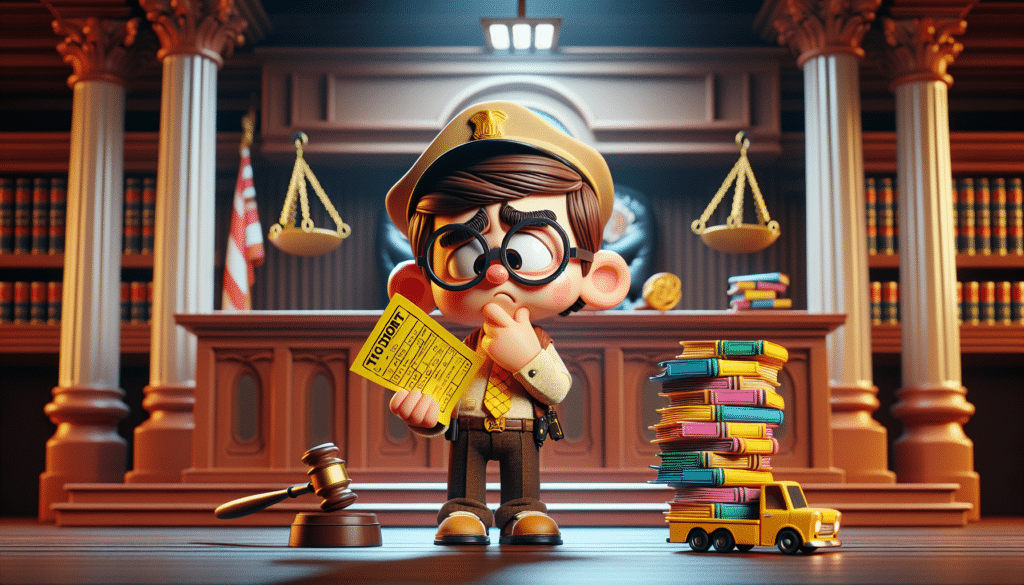Were you caught going 90 in a 65 mph zone? This serious speeding violation can result in heavy fines, points on your driving record, and even jail time. In this article, we’ll break down the consequences and explore your options for handling or fighting the ticket.
Key Takeaways
Exceeding speed limits significantly increases financial penalties, legal consequences, and impacts on driving records, making adherence to speed limits crucial.
Challenging a speeding ticket involves understanding legal implications, preparing a solid defense, and considering hiring an attorney for complex cases.
Traffic school and alternative options, such as defensive driving courses, can mitigate the effects of a speeding ticket and prevent future violations.
Understanding the Consequences of Going 90 in a 65

Exceeding the speed limit by 25 mph can lead to serious repercussions. Not only does it increase the likelihood of receiving a significant fine, but it can also result in points being added to your driving record. Keeping a clean driving record impacts your insurance rates and driving privileges. Staying within posted speed limits and monitoring your speed reduces the likelihood of getting a speeding ticket.
Speed limits are in place for a reason. They ensure the safety of all road users and help prevent accidents. Understanding and following these limits helps you avoid the trouble and cost of speeding tickets.
Being mindful of your driving habits and adjusting your speed according to traffic conditions can make a significant difference in avoiding violations. Safe driving protects both you and everyone else on the road.
Legal Implications and Penalties

When you’re caught speeding, especially at 90 in a 65 mph zone, the legal implications can be severe. The penalties for such a violation can vary depending on the jurisdiction, but they generally include hefty fines, potential jail time, and a significant impact on your driving record.
Knowing these legal consequences helps you navigate your case effectively.
Misdemeanor vs. Felony Charges
Speeding violations can range in severity, from simple infractions to misdemeanors and even felonies. For instance, driving 25 mph over the speed limit in a construction zone can elevate the offense to a Class 1 misdemeanor, which carries harsher penalties. Generally, excessive speeding can lead to Class B misdemeanors, and under certain circumstances, it can even escalate to felony charges. Knowing the difference between these classifications and their penalties helps you prepare your defense.
Felony charges are typically reserved for the most severe cases, such as those involving reckless endangerment or repeated offenses. These charges carry significant legal repercussions, including longer jail sentences and higher fines. Grasping the seriousness of your speeding violation and its potential to escalate to felony charges helps determine the best course of action.
Fines and Court Costs
The financial impact of a speeding ticket can be substantial. For a Class 2 misdemeanor, the minimum penalty includes a $150 fine and at least 10 days of jail time, while the maximum penalty can reach up to 90 days in jail and fines of $300. In addition to these fines, surcharges may be applied to your speeding violation, contributing to funds for victims and law enforcement. These costs can quickly add up, making it essential to consider all financial implications when dealing with a speeding ticket.
It’s also important to note that court costs can vary by county and state. Some counties may impose additional charges for court procedures, which can further increase the overall cost of your speeding ticket. Knowing these expenses helps you prepare financially and decide whether to contest the ticket or seek alternatives like traffic school.
Impact on Driving Record
A speeding ticket typically remains on your driving record for a minimum of three years, although the duration can vary by state. More severe traffic violations, like DUI or reckless driving, can remain on your record much longer, sometimes permanently. The points from a speeding violation can impact your driving privileges and insurance rates, often for the duration the ticket remains on your record.
In states utilizing a point system, accumulating too many points can lead to the suspension of your driving privileges. Some states provide options for mitigating these points, such as completing defensive driving courses, which can help maintain your driving record and avoid more severe penalties.
Knowing how a speeding ticket affects your driving record helps you evaluate options to minimize its impact.
Defending Against a Speeding Ticket

Contesting a speeding ticket can be a daunting task, but establishing a strong traffic court strategy can increase your chances of success. From questioning the accuracy of the speed measuring equipment to hiring an attorney, there are several approaches you can take to defend against a speeding ticket.
Adequate court preparation and knowing your legal options are vital steps in this process.
Valid Defenses
One common defense against a speeding ticket is to question the accuracy of the speed measuring equipment used by law enforcement. Errors can occur due to miscalibration or interference, which can cast doubt on the validity of the radar readings.
Another viable defense is to demonstrate that the prosecution cannot prove a necessary element of the offense. For instance, challenging the officer’s view or providing credible evidence that supports your version of events can enhance your defense.
Other defense strategies include proving a ‘mistake of fact,’ such as if conditions made it difficult to see a stop sign, or using the necessity argument, which states that speeding was required to prevent a serious accident or avoid danger.
If the speed limit sign was obscured or missing, this can also serve as a defense, suggesting that you were unaware of the limit. Using these defenses can improve your chances of getting the ticket dismissed.
Hiring an Attorney
Hiring an attorney can be highly beneficial, especially if complex legal arguments are involved in your case. An experienced lawyer can help navigate the legal system, challenge the prosecution’s case, and provide a strong defense on your behalf. They can also advise you on the best course of action, whether it’s contesting the ticket or negotiating a plea deal.
Consulting a lawyer can often help uncover weaknesses in the prosecution’s case, like procedural errors or lack of evidence. This might lead to reduced or dismissed charges, saving you severe penalties and preserving your driving record.
While hiring an attorney involves costs, the potential benefits often outweigh the expenses, making it a worthwhile investment for serious speeding violations.
Preparing for Court
Preparing for court involves gathering sufficient evidence to support your case, which is vital for a successful defense. Creating diagrams and gathering witness statements can be crucial for effectively illustrating your case in court. Bringing photographs of the scene can support your claims regarding road conditions or visibility issues.
Physical evidence, such as dashcam footage or witness statements, can significantly strengthen your argument. A well-organized presentation and understanding legal procedures can significantly affect your case’s outcome.
Thorough preparation helps you present a compelling case and increases your chances of dismissal.
Traffic School and Alternative Options

Attending traffic school is a commonly recommended option for individuals looking to mitigate the consequences of a speeding ticket. Traffic school programs offer various formats, including in-person classes and approved online courses, providing flexibility for those with busy schedules.
Additionally, there are other alternatives, such as community service or defensive driving courses, depending on local regulations.
Eligibility for Traffic School
Eligibility for traffic school varies by state, and not all violations qualify for this option. Generally, to qualify for traffic school, individuals must possess a valid driver’s license, the ticket must be for a noncommercial vehicle, and they should not have attended traffic school in the past 18 months. Certain offenses, such as equipment violations or those related to drugs and alcohol, typically do not qualify for traffic school.
Not all drivers are eligible for traffic school; those with serious violations or prior attendance in a specified period may be excluded. Knowing the eligibility criteria helps determine if this option is available and decide the best course of action to mitigate your speeding ticket’s consequences.
Benefits of Traffic School
Completing a defensive driving course can offer discounts on insurance premiums, even if traffic school isn’t an option for a specific ticket. Defensive driving courses may serve as an alternative to traffic school, focusing on improving driving skills and safety awareness. These courses can provide valuable knowledge and techniques to help you become a safer driver and avoid future violations.
Attending traffic school can help reduce points on your driving record and may lead to lower insurance rates. This can be particularly beneficial in maintaining your driving privileges and avoiding the long-term financial impact of higher insurance premiums. The educational aspect of traffic school can also enhance your understanding of traffic laws and safe driving practices.
Other Alternatives
Community service and defensive driving courses are potential alternatives to traffic school or paying fines for traffic violations. These options can provide a way to mitigate the consequences of a speeding ticket while contributing positively to the community or improving your driving skills.
Exploring these alternatives can help you find a solution that best fits your situation.
Preventing Future Speeding Violations

Preventing future speeding violations involves understanding speed limits, using technology to monitor your speed, and developing safe driving habits. By adopting these practices, you can avoid the legal and financial repercussions of speeding tickets and contribute to safer roads for everyone.
Understanding Speed Limits
Adhering to speed limits helps ensure road safety for all users. Exceeding speed limits can lead to severe consequences, including fines and points on your driving record. Different speed zones, such as residential or school zone, have specific limits that must be respected. Recognizing and adhering to these limits is crucial for maintaining safe driving practices and avoiding accidents.
Knowing the posted speed limit and adjusting your speed to road conditions reduces the risk of getting a speeding ticket. Driving within speed limits protects both you and others on the road from potential harm.
Using Technology
GPS apps can provide real-time speed monitoring, alerting drivers when they exceed the speed limit. These applications can help drivers stay within legal speed limits while driving, promoting safer driving habits. Using such technology reduces the risk of speeding tickets and enhances road safety.
Navigation apps can also provide alerts if you exceed the speed limit, helping you stay informed about your current speed and the posted limits. Incorporating these tools into your routine helps maintain compliance with speed limits and avoid the repercussions of speeding violations.
Safe Driving Habits
Consistent adherence to safe driving practices, such as maintaining a safe following distance, can reduce the likelihood of speeding. Developing a mindset for cautious driving helps in maintaining a safe speed according to road conditions. Cultivating these habits helps avoid reckless driving and contributes to safer roads.
Completing traffic school can enhance your knowledge of road rules and potentially lead to lower insurance premiums. This educational approach not only helps in avoiding future violations but also promotes a culture of safety and responsibility on the road.
Embracing these safe driving habits can make a significant difference in preventing speeding tickets and ensuring a safer driving experience.
Summary
Navigating the complex world of speeding tickets can be daunting, but understanding the legal implications and knowing your options can make a significant difference. From recognizing the severe consequences of going 90 in a 65 mph zone to exploring valid defenses and considering traffic school, there are various strategies to mitigate the impact of a speeding ticket. Hiring an attorney and preparing thoroughly for court can also enhance your chances of a favorable outcome.
Preventing future speeding violations is equally important. By adhering to speed limits, utilizing technology to monitor your speed, and developing safe driving habits, you can avoid the legal and financial repercussions associated with speeding tickets. Embrace these practices, not only to protect yourself but also to contribute to safer roads for everyone. Stay informed, drive responsibly, and remember that safety should always be your top priority.
Frequently Asked Questions
What are the consequences of going 90 in a 65 mph zone?
Going 90 in a 65 mph zone can result in substantial fines, points added to your driving record, and possibly jail time. Such actions not only jeopardize your legal standing but also your safety and that of others on the road.
Can a speeding ticket escalate to a felony charge?
Yes, a speeding ticket can escalate to a felony charge if it involves serious endangerment or results in injury or death. It is crucial to recognize the severe implications of reckless driving.
How can I defend against a speeding ticket?
To effectively defend against a speeding ticket, you can question the accuracy of the speed measuring equipment, demonstrate a legitimate mistake of fact, or prove that you had to speed to avoid imminent danger. Presenting clear and compelling evidence for any of these defenses is crucial for a successful outcome.
What are the benefits of attending traffic school after receiving a speeding ticket?
Attending traffic school offers significant benefits, including the potential reduction of points on your driving record and lower insurance rates. Additionally, it enhances your understanding of traffic laws and safe driving practices.
How can I prevent future speeding violations?
To prevent future speeding violations, it is essential to understand and adhere to speed limits, utilize technology such as speed alerts, and cultivate safe driving habits. By prioritizing these measures, you can significantly reduce the risk of speeding.




